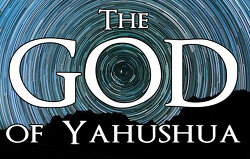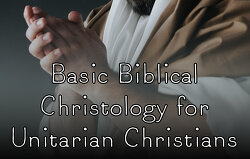While WLC continues to uphold the observance of the Seventh-Day Sabbath, which is at the heart of Yahuwah's moral law, the 10 Commandments, we no longer believe that the annual feast days are binding upon believers today. Still, though, we humbly encourage all to set time aside to commemorate the yearly feasts with solemnity and joy, and to learn from Yahuwah’s instructions concerning their observance under the Old Covenant. Doing so will surely be a blessing to you and your home, as you study the wonderful types and shadows that point to the exaltation of Messiah Yahushua as the King of Kings, the Lord of Lords, the conquering lion of the tribe of Judah, and the Lamb of Yahuwah that takes away the sins of the world.
The God of Yahushua
Those who believe in the doctrine of the Trinity say that a denial of an eternally preexistent “God the Son” diminishes Yahushua by stripping him of divinity. But one can reject the doctrine of the Trinity and yet still affirm Christ’s “divine nature” by pointing to his unique origin as Son of Yahuwah.
Comments: 2
Hits: 2871
Christ’s Standard of Discipleship
Obedience to Yahushua is the essence of salvation. Are YOU obeying the true Gospel of the Kingdom?
Comments: 0
Hits: 1964
Basic Biblical Christology for Unitarian Christians
Is Yahushua God? To most Christians for the past 1700 years, the answer has been a firm Yes. But is this what the Bible actually teaches?
Comments: 0
Hits: 3807
What Do People ''Do'' When They Die?
Is there consciousness after death? Find out what the Bible has to say!
Comments: 9
Hits: 2971
Some Thoughts on the History of the Trinity
The Trinity is a product of Greek philosophy. It cannot be substantiated by Scripture.
Comments: 0
Hits: 2818
A Letter from the Lord Yahushua
A thought-provoking article on the fallacy of the Trinity doctrine espoused today by so many well-meaning Christians: Who will you believe? ...Yahushua or pagan tradition?
Comments: 0
Hits: 2785
The One Gospel
What could be more important than believing & proclaiming the right GOSPEL? The Gospel is Yahuwah's Good News!
Comments: 8
Hits: 3362
The Prologue to John’s Gospel
The article goes in some depth into John’s prologue. We think you will find it helpful in your explanation of what John really intended when he spoke of the word, not the “Word,” as if the Word meant the Son in John 1:1. The Son is what the word became (v. 14), not one to one equivalent to the word. The Son came into existence when the word was made flesh. This will harmonize John beautifully with Matthew’s and Luke’s view of how the Son began to exist.
Comments: 6
Hits: 2950
The First Verse of the Gospel of John
“In the beginning was the Word, and the Word was with God, and the Word was God.” ...What does this mean? Find out from a BIBLICAL perspective!
Comments: 7
Hits: 3755
A Glimpse of the Christian Future in the Kingdom
Imagine waking up one day and realizing that there is no more war, no more having to rush, and no more worries...
Comments: 0
Hits: 3153
Believing Yahushua’s Gospel
To believe the gospel is to be saved; not to believe the gospel is to be condemned. To believe the Son is to have everlasting life; not to believe the Son is not to have life but come under the wrath of Yahuwah. Clearly, then, what one believes or does not believe is an extremely important matter having consequences beyond this life. But what must one believe? What is Yahushua’s gospel? What is it to “believe in the Son”?
Comments: 1
Hits: 2837
Power Under Authority
All our dealings with Yahuwah and all Yahuwah’s dealings with us are mediated through the one “authorized dealer” of spiritual things, the man approved of Yahuwah, Yahushua of Nazareth. The simplicity of our creed, as distinct from the hair-raising complexities of later Trinitarianism, which really destroy the agency principle, is worth repeating. May our children never forget that “There is one God, and one mediator between that God and man, the man Messiah Yahushua” (1 Tim. 2:5).
Comments: 2
Hits: 2121
Enoch & Elijah are not in Heaven! But do you know where the Bible says they are?
Christians have long believed that Enoch and Elijah were “translated” to Heaven. That belief, however, is based on a faulty assumption. Learn what the Bible says really happened after Yahuwah took them. It’s not what you’ve been told!
Comments: 20
Hits: 7142
What Must I Do to Be Saved?
This thrilling piece of apostolic history contains the most important question that can be framed by human lips. It is not, What must I do to obtain health, or wealth, or fame, or some high position of human power and grandeur; but infinitely more than all these: “What must I do to be saved?”
Comments: 8
Hits: 3421
Keep It Simple
Do you agree with Yahushua or is your loyalty to tradition? Christians must, by definition, have the same creed as Christ!
Comments: 0
Hits: 2776
Losing Luke and Jumping to John
The most important question to be asked in relation to the Son of Yahuwah is about his origin. Where did he come from, how and when? There is a yawning chasm of difference between a person who has existed for eternity as eternal Yahuwah, before appearing as a human being, and one who begins to exist in the womb of his mother. A genuine human being must, by definition, begin to exist in his mother’s womb!
Comments: 8
Hits: 2701
Flat Earth Bible Verses (More than 200)
More than 200 Bible verses that support the Flat Earth model...
Comments: 8
Hits: 59663
The Struggle of Scholars to Find the Triune God
Debunking the "Trinity" Doctrine: Theological literature and particularly evangelical apologetic writing in support of the Trinity attempts to make its case against an increasing volume of opposition from solid exegetical and lexical fact and the historical examination of the Bible.
Comments: 0
Hits: 4696
What does the Bible mean by ''Preaching the Gospel''?
What, according to Yahushua, was the purpose of his whole mission? You might be surprised!
Comments: 4
Hits: 4019
How Plato Influenced Our View of Yahuwah
Many Christians sitting in the pew believe that their view of Yahuwah is derived solely from the Bible. They would never suspect, however, that the roots of their belief in a triune God comes, not from Scripture, but from Greek philosophy.
Comments: 9
Hits: 5394


























